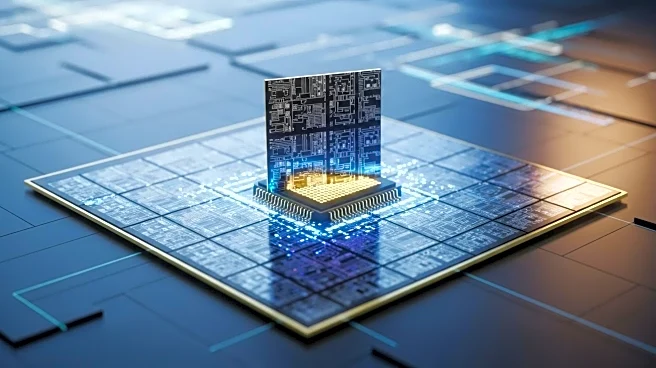What's Happening?
Nvidia has emerged as a dominant force in the semiconductor industry, capitalizing on the surge in demand for artificial intelligence (AI) technologies. The company's fiscal 2025 results highlight a significant revenue increase, reaching $130.5 billion, with a notable contribution from the data center segment. This growth is driven by the increasing need for AI chips, as enterprises and cloud providers expand their AI infrastructure. Nvidia's technological advancements, such as the Blackwell GPU architecture, have further solidified its position, offering substantial performance improvements over previous models. Despite facing challenges like U.S. export restrictions to China, which have impacted its market share in the region, Nvidia maintains a strong hold on the global market, particularly in the add-in-board GPU sector.
Why It's Important?
Nvidia's strategic positioning in the AI sector is crucial for the broader semiconductor industry, as it sets the pace for technological innovation and market dynamics. The company's ability to sustain growth amidst geopolitical challenges underscores its resilience and the inelastic demand for high-performance computing solutions. Nvidia's dominance benefits stakeholders across various industries, including healthcare and finance, where AI applications are becoming integral. However, the company's reliance on a few key customers poses a risk, as any changes in their spending could affect Nvidia's revenue. Nonetheless, the high switching costs associated with AI infrastructure provide Nvidia with a competitive edge, ensuring its continued influence in the market.
What's Next?
Looking ahead, Nvidia is poised to maintain its leadership in the AI semiconductor market, with ongoing innovations in AI inference and edge computing. The company's focus on expanding its ecosystem of developers and software partnerships will likely enhance its market position. While geopolitical tensions and customer concentration remain challenges, Nvidia's structural advantages and technological leadership are expected to drive long-term growth. Investors and industry stakeholders will be closely monitoring Nvidia's ability to navigate these challenges and capitalize on the expanding AI market.
Beyond the Headlines
Nvidia's role in the AI boom highlights broader implications for the semiconductor industry, including the ethical and regulatory considerations of AI technologies. As AI becomes more pervasive, issues related to data privacy, algorithmic bias, and the environmental impact of semiconductor manufacturing may come to the forefront. Nvidia's innovations could also influence global supply chain dynamics, as countries and companies seek to secure access to critical technologies. The company's strategic decisions will likely shape the future landscape of AI and semiconductor industries.











